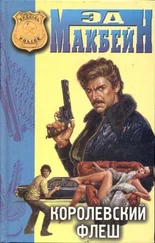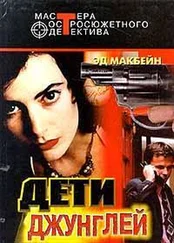“I got a call from Ballistics ten minutes ago,” Levine said. “Guy named Dorfsman, smart guy, very alert. On the slugs they dug out of the girl’s chest and head. You working a case involving a .38-caliber Smith and Wesson?”
“Yes?” Carella said.
“A homicide this would be. The case you’re working. You sent some slugs to Dorfsman, right?”
“Yes?” Carella said. He was still writing. He was still looking across the room.
“They match the ones that iced the girl.”
“You’re sure about that?”
“Right down the line. Dorfsman doesn’t make mistakes. The same gun was used in both killings.”
“Uh-huh,” Carella said.
Across the room, Miscolo said, “Bear down now.”
“Hard,” Meyer said.
“However you want to,” Miscolo said.
“So what I want to know is who takes this one?” Levine asked.
“You’re sure it’s the same gun?”
“Positive. Dorfsman put the bullets under the microscope a dozen times. No mistake. The same .38-caliber Smith and Wesson.”
“Midtown East is a long way from home,” Carella said.
“I know it is. And I’m not trying to dump anything on you, believe me. I just don’t know what the regs say in a case like this.”
“If they’re related, I would guess—”
“Oh, they’re related, all right. But is it yours or mine, that’s the question. I mean, you caught the original squeal.”
“I’ll have to check with the lieutenant,” Carella said. “When he comes in.”
“I already checked with mine. He thinks I ought to turn it over to you. This has nothing to do with how busy we are down here, Carella. One more stiff ain’t gonna kill us. It’s that you probably already done a lot of leg work—”
“I have,” Carella said.
“And I don’t know what you come up with so far, if anything—”
“Not much,” Carella said. “The victim here was a small-time gram dealer.”
“Well, this girl’s a dancer, the victim here.”
“Was she doing drugs?”
“I don’t have anything yet, Carella. That’s why I’m calling you. If I’m gonna start, I’ll start. If it’s your case, I’ll back off.”
“That’s the way,” Meyer said. “Very good.”
“We can see the head,” Miscolo said. “Now you can push a little harder.”
“That’s the way,” Meyer said again.
“I’ll check with the lieutenant and get back to you,” Carella said. “Meanwhile, can you send me the paper on this?”
“Will do. I don’t have to tell you—”
“The first twenty-four hours are the most important,” Carella said by rote.
“So if I’m gonna move, it’s got to be today.”
“I’ve got it,” Carella said. “I’ll call you back.”
“Push!” Miscolo said.
“Push!” Meyer said.
“Oh, my God!” the woman said.
“Here it comes, here it comes!” Meyer said.
“Oh, my God, my God, my God!” the woman said exultantly.
“That’s some little buster!” Miscolo said.
Meyer lifted the blood-smeared infant and slapped its buttocks. A triumphant cry pierced the stillness of the squadroom.
“Is it a boy or a girl?” one of the drunks whispered.
Carella did not call Levine back until ten minutes past 11:00, because that was how long it took to straighten out the protocol regarding the two corpses. By that time, the squadroom had quieted down considerably. The no-longer-pregnant hooker and her operatic new daughter had been taken by ambulance to the hospital, and the four drunks had been booked for Public Intoxication and led out of the station house to the waiting van by a triumphant Detective Genero, who perhaps did not realize that Public Intoxication was a mere violation as opposed to a misdemeanor or a felony, and was punishable only by a sentence not to exceed fifteen days. There was not a man or woman in that squadroom on that bright February morning who did not realize that Genero was wasting the city’s time and therefore money by dragging those drunks downtown, where they would undoubtedly be turned loose at once by a judge who knew that every available inch of cell space was needed for more serious offenders than a quartet of happy imbibers. Blithely, Genero went his way. The men — and the one woman who arrived at the squadroom at 11:00 A.M. that Saturday, just as Genero was leading his procession of prisoners out — shook their heads in unison and moved on to the more serious matters at hand.
The woman was a detective/2nd on loan from Headquarters Division’s Special Forces Unit. Her name was Eileen Burke, and she worked out of the Eight-Seven only occasionally, usually on cases requiring a female decoy. Which meant that whenever Eileen worked up here, she walked the streets alone as bait for a mad rapist, or any other kind of degenerate person out there. Eileen had red hair and green eyes; Eileen had long legs, sleek and clean, full-calved and tapering to slender ankles; Eileen had very good breasts and flaring hips and Eileen was five feet nine inches tall, all of which added up to someone who could not be missed on a city street if someone else had rape on his mind. But Eileen had once worked a mugging case up here, too, with Hal Willis as her backup, and she’d coincidentally worked another case with Willis as her partner in a sleeping bag in the park, both of them pretending to be passionate lovers in a complicated stakeout that included Detectives Meyer and Kling dressed as nuns and sitting on a nearby bench.
Eileen could not later remember the purpose of the elaborate stakeout. She remembered only that Willis kept putting his hand on her behind while she tried to watch a third bench on which there was a lunch pail that was supposed to contain $50,000 but instead contained fifty thousand scraps of newspaper. Willis — in his role as ardent lover — kissed her a lot while they huddled together in the sleeping bag on that bitterly cold day. The necking came to an abrupt halt when a young man picked up the lunchpail bait and began walking away toward the bench upon which the fake blind man Genero was sitting, whereupon Genero leaped to his feet, ripped off his dark glasses, unbuttoned the third button of his coat the way he had seen detectives do on television, reached in for his revolver, and shot himself in the leg. In the sleeping bag, Willis managed to slide the walkie-talkie up between Eileen’s breasts and began yelling to Hawes, who was parked in an unmarked car on Grover Avenue, that their man was heading his way — it was always fun working out of the Eight-Seven, Eileen thought now. She also thought it was a shame she only got to see Willis every once in a while. Idly, she wondered if Willis was married. Idly, she wondered why she had begun thinking of marriage so often these past few days. Was it because no one had sent her a valentine this year?
The squadroom was relatively quiet with Genero and all of his prisoners (the delivered hooker had escaped his grasp — for the time being, anyway) gone their separate ways. Cotton Hawes, at his desk, was taking a complaint from a fat black man who insisted that his wife threw hot grits all over him every time he got home late because she thought he was out larking around with another woman. Those were his words: larking around. Hawes found them somewhat poetic. Hal Willis had already gone down to book the two juves and was leading them into the alley running through the station house and adjacent to the detention cells on the street level, where Genero’s drunks were already in the van that would take them downtown. The juves still refused to take off the ski masks. One of the drunks in the van asked them if they were going to a party. As Willis delivered them to the uniformed cop, who slammed the locked door of the van behind them, Eileen Burke perched herself on the edge of Willis’s desk upstairs, and crossed her splendid legs, and then looked at her watch, and then lit a cigarette.
Читать дальше









